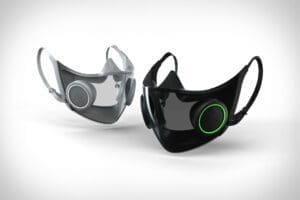 We are truly living in the smart era; we have smart phones, smart TVs, smart cars, smart appliances, and really just about any other smart item you could imagine. And now, the smart face mask is set to become a reality. In January, game hardware company Razer unveiled what was then called Project Hazel during the virtual CES show. The company called the prototype the world’s “smartest and most socially friendly” face mask. The project has now been green-lit and consumers should see the masks available in Q3. While it is unclear which features from the prototype will be included in the final design, the waterproof mask promised N95 medical-grade respirator protection and had a built-in microphone and amplifier so your voice could be heard better. Additionally, the mask had a clear transparent face area with internal lights to illuminate your face in dark conditions. The prototype also included external lights for what it called “extra flair.” I can’t wait to get my hands on one of these. And now on to this week’s logistics news.
We are truly living in the smart era; we have smart phones, smart TVs, smart cars, smart appliances, and really just about any other smart item you could imagine. And now, the smart face mask is set to become a reality. In January, game hardware company Razer unveiled what was then called Project Hazel during the virtual CES show. The company called the prototype the world’s “smartest and most socially friendly” face mask. The project has now been green-lit and consumers should see the masks available in Q3. While it is unclear which features from the prototype will be included in the final design, the waterproof mask promised N95 medical-grade respirator protection and had a built-in microphone and amplifier so your voice could be heard better. Additionally, the mask had a clear transparent face area with internal lights to illuminate your face in dark conditions. The prototype also included external lights for what it called “extra flair.” I can’t wait to get my hands on one of these. And now on to this week’s logistics news.
- Amazon workers reject unionization in Alabama
- URB-E looks to electric bicycles to make grocery delivery more efficient
- Beta Technologies to supply UPS with electric vertical aircraft
- Domino’s pizzas now delivered with autonomous cars in Houston
- The US is facing a lithium-ion battery shortage
- Japan’s ketchup king halts Xinjiang tomato imports
- Walmart commits to restoring pollinator habitats and reversing nature loss
- Nike to clean up used, returned sneakers and put them back on shelves
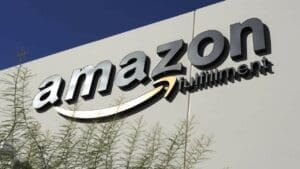 In early March, ballots were sent out to nearly 6,000 workers at an Amazon warehouse in Bessemer, Alabama to vote on whether they wanted to be represented by the Retail, Wholesale and Department Store Union. The votes are in, and those workers have rejected unionization, which is a major victory for Amazon, as it has been fighting off unionization at its warehouses for more than two decades. The vote was overwhelmingly anti-union, with a more than two-thirds of voters choosing not to unionize. A union victory could have triggered more unionization efforts across the country, but Amazon’s victory helps to put a pause on future union talks. The closely watched vote will probably face challenges at the National Labor Relations Board and in court that could delay the final outcome.
In early March, ballots were sent out to nearly 6,000 workers at an Amazon warehouse in Bessemer, Alabama to vote on whether they wanted to be represented by the Retail, Wholesale and Department Store Union. The votes are in, and those workers have rejected unionization, which is a major victory for Amazon, as it has been fighting off unionization at its warehouses for more than two decades. The vote was overwhelmingly anti-union, with a more than two-thirds of voters choosing not to unionize. A union victory could have triggered more unionization efforts across the country, but Amazon’s victory helps to put a pause on future union talks. The closely watched vote will probably face challenges at the National Labor Relations Board and in court that could delay the final outcome.
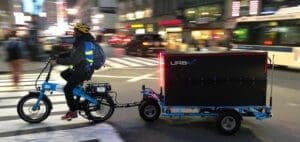 As grocery delivery becomes more commonplace, things are changing with how items are delivered, especially in busy cities. Los Angeles-based startup URB-E is looking at ways to move goods at a lower price point in crowded cities. The company has developed an electrically driven fleet of foldable cargo carts that are propelled by battery-powered bicycles. The company’s theory is that using small electric vehicles instead of trucks propelled by gasoline or diesel engines to bring grocery orders from stores to customers is the key to boosting margins on delivery orders for retailers. The bikes are equipped with 750-watt mid-drive motors and can travel up to about 12 mph while hauling 800 pounds of goods. Rather than sell its bikes and carts to retailers, URB-E rents the equipment on an as-needed basis for a fee of about $5 per hour in addition to charging a reservation fee that guarantees their availability to users.
As grocery delivery becomes more commonplace, things are changing with how items are delivered, especially in busy cities. Los Angeles-based startup URB-E is looking at ways to move goods at a lower price point in crowded cities. The company has developed an electrically driven fleet of foldable cargo carts that are propelled by battery-powered bicycles. The company’s theory is that using small electric vehicles instead of trucks propelled by gasoline or diesel engines to bring grocery orders from stores to customers is the key to boosting margins on delivery orders for retailers. The bikes are equipped with 750-watt mid-drive motors and can travel up to about 12 mph while hauling 800 pounds of goods. Rather than sell its bikes and carts to retailers, URB-E rents the equipment on an as-needed basis for a fee of about $5 per hour in addition to charging a reservation fee that guarantees their availability to users.
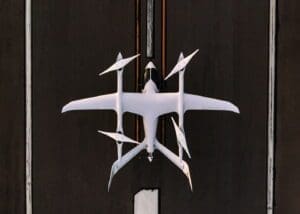 Beta Technologies is selling another type of electric vehicle for deliveries. The company has secured a deal to sell its electric vertical takeoff and landing (eVOTL) aircraft to UPS and sees the deal as a major milestone for the acceptance of eVTOLs as commercially viable. Beta Technologies will design and build 10 of its Alia-250 eVTOLs to be delivered to UPS in 2024, pending certification from the Federal Aviation Administration. The aircraft is powered by an electric battery and has five propellers, allowing it to take off vertically like a helicopter and then fly like a plane. It can carry 1,400 pounds while traveling up to 250 miles at 170 mph once fully charged. UPS plans to test the eVTOLs in its Express Air delivery network to replace small planes that can carry 500 to 3,000 pounds.
Beta Technologies is selling another type of electric vehicle for deliveries. The company has secured a deal to sell its electric vertical takeoff and landing (eVOTL) aircraft to UPS and sees the deal as a major milestone for the acceptance of eVTOLs as commercially viable. Beta Technologies will design and build 10 of its Alia-250 eVTOLs to be delivered to UPS in 2024, pending certification from the Federal Aviation Administration. The aircraft is powered by an electric battery and has five propellers, allowing it to take off vertically like a helicopter and then fly like a plane. It can carry 1,400 pounds while traveling up to 250 miles at 170 mph once fully charged. UPS plans to test the eVTOLs in its Express Air delivery network to replace small planes that can carry 500 to 3,000 pounds.
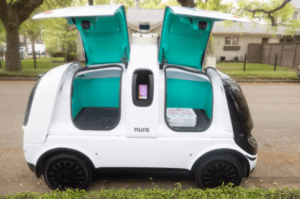 Domino’s Pizza has not been shy about testing new technologies to make deliveries. The company is now partnering with Nuro in Houston to make robocar deliveries. Nuro’s R2 self-driving car is the only vehicle to receive an exemption from the US Department of Transportation to operate despite having no human controls. On certain days and in blocked-out periods of time, customers can request their pizza for delivery via a Nuro R2 if they place a prepaid order online. Domino’s will select a customer at random to carry out the delivery order, and the customer will receive text message notifications saying where the robocar is. The customer will also get a PIN that will let them access their order when it arrives. To retrieve the order, the customer will enter the PIN on a touchscreen and the doors will retract to reveal the order. For now, the robocar delivery option is only available in the vicinity of a single pizza shop in the Houston area.
Domino’s Pizza has not been shy about testing new technologies to make deliveries. The company is now partnering with Nuro in Houston to make robocar deliveries. Nuro’s R2 self-driving car is the only vehicle to receive an exemption from the US Department of Transportation to operate despite having no human controls. On certain days and in blocked-out periods of time, customers can request their pizza for delivery via a Nuro R2 if they place a prepaid order online. Domino’s will select a customer at random to carry out the delivery order, and the customer will receive text message notifications saying where the robocar is. The customer will also get a PIN that will let them access their order when it arrives. To retrieve the order, the customer will enter the PIN on a touchscreen and the doors will retract to reveal the order. For now, the robocar delivery option is only available in the vicinity of a single pizza shop in the Houston area.
The list of product shortages continues, with US auto manufacturers feeling the crunch. While they are already facing a semiconductor shortage, auto makers are now facing a shortage of lithium-ion batteries. As more companies roll out electric vehicles, reports are surfacing that current battery production in the US won’t be able to keep up with demand. While there are a number of large-scale battery manufacturing facilities in operation, a trade dispute between two Korean battery makers, LG Chem and SK Innovation, threatens the future of new battery manufacturing facilities, as well as supplies to existing factories.
Last week, I wrote about a potential ketchup shortage that is looming in the US. It turns out that we are potentially seeing a global shortage of ketchup on the horizon as well. Leading Japanese ketchup producer Kagome has stopped importing tomatoes from China’s Xinjiang, joining the growing ranks of Western brands that have ceased sourcing materials from the region over reported abuses against Uyghur Muslims. Kagome halted import of Xinjiang-grown tomato paste used in some of its sauce products last year. Tomatoes that have already been imported will be used up by the end of this year. The good news, according to Kagome, is that Xinjiang tomatoes currently represent less than 1 percent of the tomatoes used by the group, and the produce will be replaced by tomatoes from other nations, meaning there will be no impact on production.
 Walmart has committed to restoring pollinator habitats and reversing nature loss. The company has announced that by 2025 it will source 100 percent of its fresh produce and floral from suppliers that adopt integrated pest management practices. Over the last several years, vital pollinator populations have continued to decline due to loss of habitat, pests, pollution, pesticides, and a changing climate. Working with its suppliers, stakeholders, and customers, Walmart’s new commitments serve as the largest pollinator health effort from a US grocery retailer to date, aiming to reduce several pollinator threats through promoting integrated pest management (IPM) practices and improving and expanding pollinator habitats.
Walmart has committed to restoring pollinator habitats and reversing nature loss. The company has announced that by 2025 it will source 100 percent of its fresh produce and floral from suppliers that adopt integrated pest management practices. Over the last several years, vital pollinator populations have continued to decline due to loss of habitat, pests, pollution, pesticides, and a changing climate. Working with its suppliers, stakeholders, and customers, Walmart’s new commitments serve as the largest pollinator health effort from a US grocery retailer to date, aiming to reduce several pollinator threats through promoting integrated pest management (IPM) practices and improving and expanding pollinator habitats.
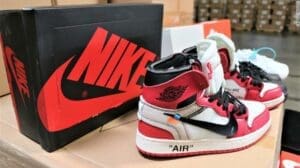 Sustainability and reducing waste continue to be top of mind for major corporations as they look at ways to improve their processes. Nike has announced that it will start refurbishing sneakers that have been returned by customers and sell them at cheaper prices. This is a service offered increasingly by retailers to reduce consumer waste. Nike said it would clean up gently worn, like-new or slightly imperfect sneakers by hand and resell them “at a value for consumers” at certain Nike stores. To qualify for refurbishment, the sneakers need to be returned to Nike stores within 60 days of purchase. Nike is continuing to explore future expansion of the program to markets outside the United States.
Sustainability and reducing waste continue to be top of mind for major corporations as they look at ways to improve their processes. Nike has announced that it will start refurbishing sneakers that have been returned by customers and sell them at cheaper prices. This is a service offered increasingly by retailers to reduce consumer waste. Nike said it would clean up gently worn, like-new or slightly imperfect sneakers by hand and resell them “at a value for consumers” at certain Nike stores. To qualify for refurbishment, the sneakers need to be returned to Nike stores within 60 days of purchase. Nike is continuing to explore future expansion of the program to markets outside the United States.
That’s all for this week. Enjoy the weekend and the song of the week, Soothsayer, by my favorite masked guitarist, Buckethead.

















